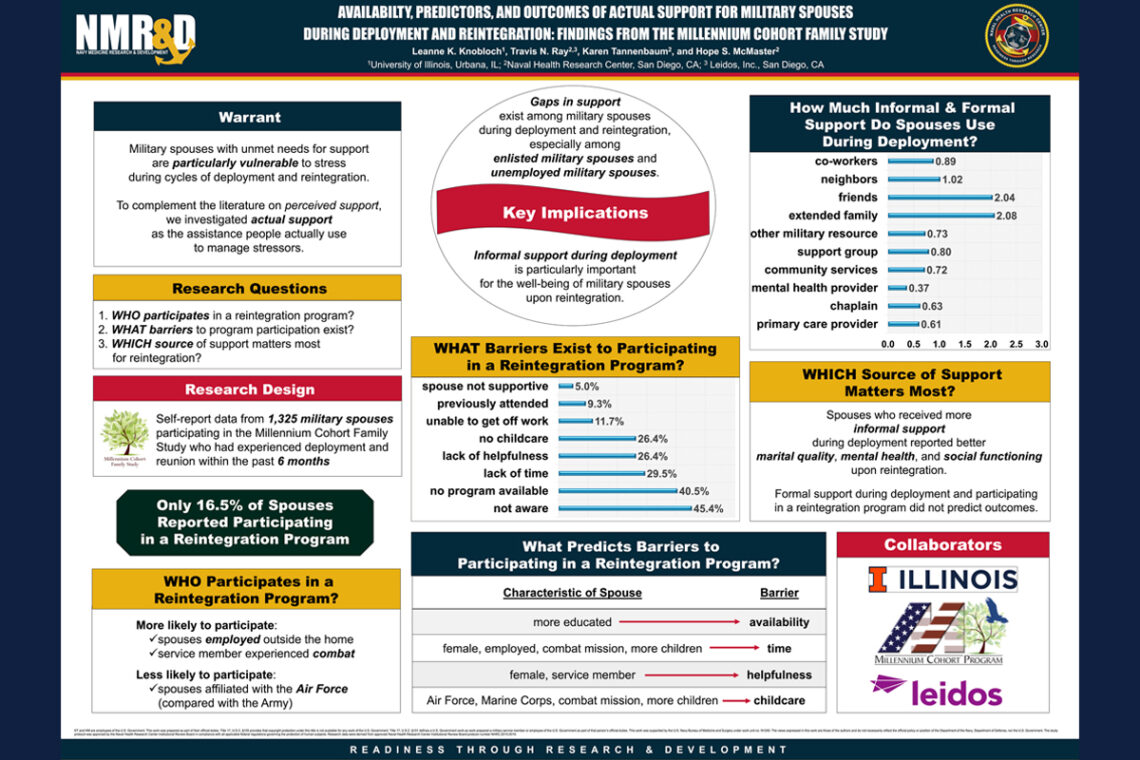Cycles of deployment and reintegration can be stressful, disruptive times for military spouses and their families. Although the Department of Defense and its military communities offer a number of formal resources to help military spouses cope during these challenging periods, very few of those who participated in a recent study said they actually used them. Only 16.5% of those in the study had participated in a formal reintegration program after their partners returned from deployment.
The findings are concerning and contribute to a growing body of research indicating that thousands of military spouses may not be receiving the support they need when attempting to establish a new normal during their partners' deployment and return, said communication professor Leanne Knobloch of the University of Illinois Urbana-Champaign. Knobloch led the project, which evaluated data from 1,325 military spouses whose partners had returned from deployment within the previous six months.
"Our findings point to extended family and friends as the unsung heroes
who are rallying to support military spouses."
Leanne Knobloch
Naval Health Research Center research psychologists Hope S. McMaster, Karen Tannenbaum and Travis N. Ray co-wrote the paper, published in the journal Military Psychology. The team analyzed data from the Millennium Cohort Family Study, a nationwide study of military families that began in 2011. McMaster is the principal investigator for that project.
"Military spouses who have unmet needs for support are vulnerable to stress during cycles of deployment and reintegration," Knobloch said. "Most of the literature looks at perceptions of support by asking people, 'If you needed something, would you have someone in your life who could provide it for you?' We wanted to take a different route and ask military spouses about the support that they actually received and used to manage stressors during deployment and reintegration."
A poster showing the study's key findings.The researchers documented the availability and outcomes of different types of support, including formal sources - such as chaplains, support groups, health care practitioners and community services - and informal sources - such as family, friends, neighbors and co-workers - to determine whether any of these predicted spouses' mental health, social functioning and marital quality during reintegration.

Image provided
The participants' ages ranged from 18 to 63. The majority were female, 86% of them were civilians and more than half of them had at least one child. More than 67% were married to enlisted service members. Approximately 84% of the service members were on active-duty status. Their military branch affiliations included the Air Force (about 41%), Army (38%), Navy (12%) and the Marine Corps (about 9%), according to the study.
A striking finding of the study was how little actual support military spouses reported receiving across the deployment cycle, the researchers said. Slightly more than 21% of the spouses said they received formal services. However, the majority (52%) said they relied on informal sources, such as the individuals in their social network.
"Military spouses who received informal support from friends and family members had better outcomes upon reintegration. They reported better marital quality, mental health and social functioning upon reintegration, which underscores the importance of the social circle surrounding them," Knobloch said.
"Our findings point to extended family and friends as the unsung heroes who are rallying to support military spouses. Those unsung heroes may not be as visible for military command, policy or programming, but they are carrying much of the load," Knobloch said. "Recognizing their contributions is really important."
Because informal sources of support were so potent, they may supersede the value of formal services and provide the most return on investment, the team said.
"When we asked military spouses why they didn't participate in a formal reintegration program, a little less than half said they weren't aware of these programs. Another 40% said that there was no program available to them. These barriers tell us why people are not taking advantage of these resources," Knobloch said.
Other reasons for nonparticipation were time constraints (29%), doubts about whether the training would be helpful (26%), a lack of child care (26%) and work conflicts (11%). Another 9% of those surveyed said they had participated in such training previously and did not need to repeat it, while 5% said that their partner had discouraged it, according to the study.
Skepticism about the usefulness of the services was a barrier particularly among women and spouses who were in the military themselves, while a lack of child care was a barrier for parents of multiple children and those affiliated with the Air Force or the Marine Corps, according to the study.
Spouses were more likely to participate in a formal reintegration program if they were employed outside the home or if their partner had been in combat, the team found. Certain groups were underserved across various sources of support, including spouses of enlisted personnel, those who were Hispanic and those who were unemployed.
Overall, the findings indicated that one-size-fits-all solutions to formal reintegration programs may not adequately address the various barriers to accessing these programs that spouses face, the teams said. Tailored outreach strategies might be helpful such as providing on-demand virtual training or promotional materials about the programs' efficacy or providing child care for parents.
Their other recommendations included making support programs for military spouses a command-level priority, in part to bolster retention of service members, as studies indicate they are more likely to leave the armed forces if their spouses' needs are not being met. The team further suggested educating civilians about military life and engaging them in efforts to assist military spouses.
The Millennium Cohort Family Study is one of three studies within the broader Millennium Cohort Program, which includes the Millennium Cohort Study of service members and the Study of Adolescent Resilience. McMaster is the principal investigator for SOAR as well.
The Millennium Cohort Program is funded by the Defense Health Agency, the Department of Veteran Affairs and the Office of Military Community and Family Policy.






